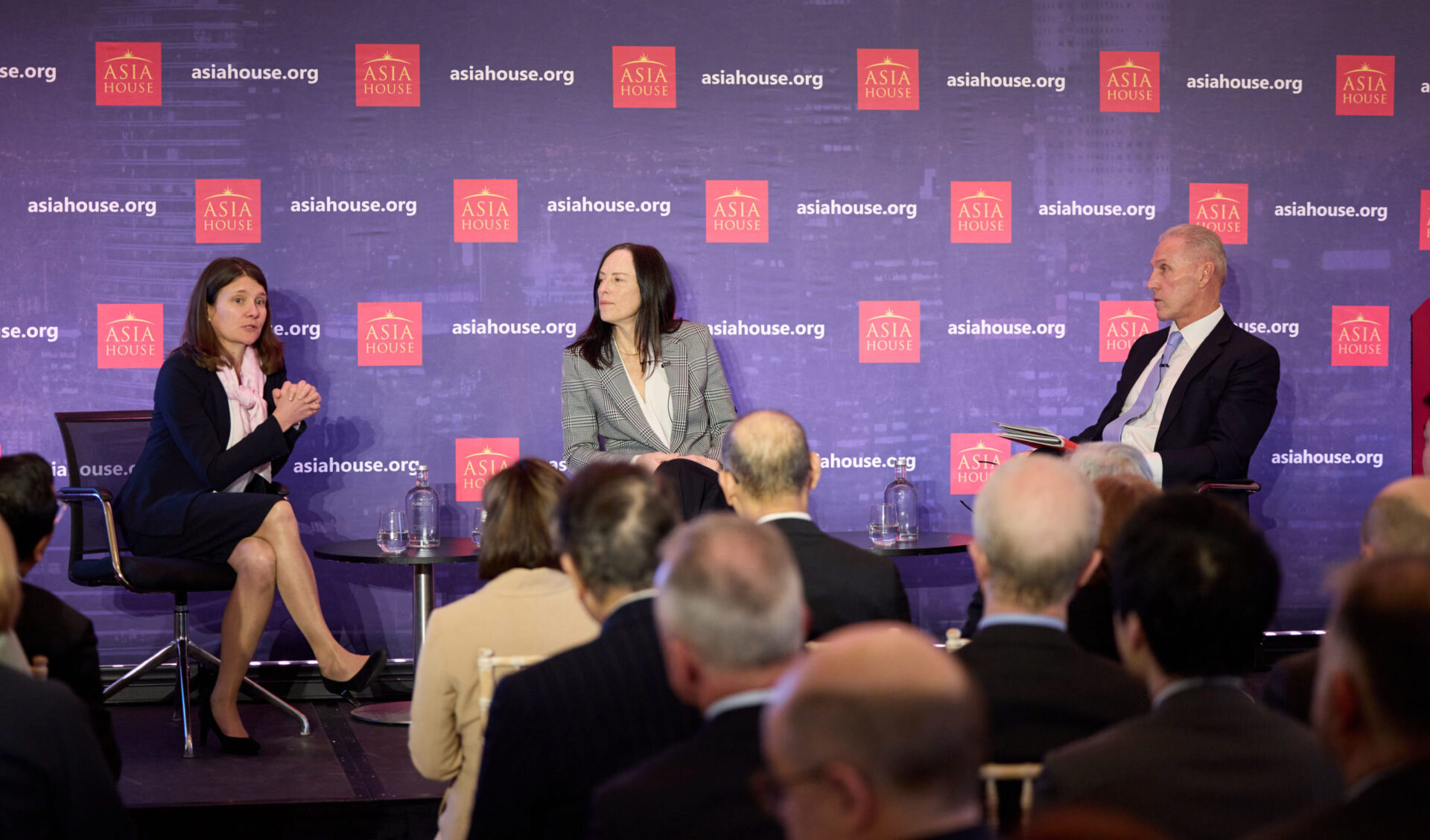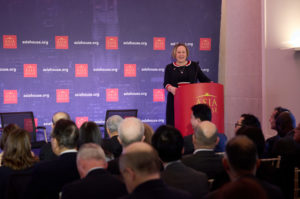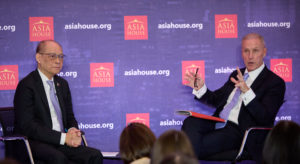Driving commercial and political engagement between Asia, the Middle East and Europe
Driving commercial and political engagement between Asia, the Middle East and Europe
Driving commercial and political engagement between Asia, the Middle East and Europe

Leading policy and business figures gathered in London for launch of Asia House Annual Outlook 2023: Resilience Required to Confront Uncertainty
30 January 2023
Asia House convened leading policy and business figures at its London headquarters on 25 January to discuss the findings of its flagship report: The Asia House Annual Outlook 2023.
Click here to watch a full video of the event.
Economic commentators and politicians delved into the report and spoke more broadly about Asia’s outlook. Benjamin E Diokno, The Philippines’ Finance Secretary and Anne-Marie Trevelyan UK Minister for Indo-Pacific, gave keynote speeches. In addition, a panel discussion was held between HSBC Chief Economist Janet Henry, former Indonesian Trade Minister Tom Lembong, and Moody’s Global Head of Sovereign and Sub-sovereign risk, Marie Diron.
The Asia House Annual Outlook examines the economic prospects for Asia in 2023 across eight economies: China, Japan, India, Indonesia, Vietnam, Malaysia, Thailand and The Philippines
It identifies that Asia can defy a global economic slowdown in 2023 through an acceleration in digital transformation, greater regional coordination, and green finance.
However, and mirroring the global outlook, Asia is susceptible to several geopolitical risk and shocks, such as energy-price volatility, geopolitical tensions, and higher borrowing costs.
The event was chaired by Asia House Chief Executive, Michael Lawrence OBE.
Asia as driver of global economic growth
In his introductory remarks, Asia House Chairman Lord Stephen Green, explained that Asia has been one of the key drivers of growth for the world economy for the last 30 years and will continue to do so. Lord Green also explained how Asia House’s Economic Readiness Indices measured green finance and digitalisation across Asian countries – and these are crucial areas which will unlock future productivity and facilitate the region’s sustainable transition.
UK-Asia relationship
 Anne-Marie Trevelyan, UK Minister for Indo-Pacific, addressed the audience, which included stakeholders both in the room and virtually from Asia and globally, on why a mutually beneficial relationship between the UK and the region was crucial.
Anne-Marie Trevelyan, UK Minister for Indo-Pacific, addressed the audience, which included stakeholders both in the room and virtually from Asia and globally, on why a mutually beneficial relationship between the UK and the region was crucial.
The minister added innovation and collaboration were imperative for “tackling the biggest issue facing us all, climate change.”
She explained the Indo-Pacific region is on the “frontline with many littoral communities threatened by rising seas, typhoons and millions at the mercy of drought.
“UK climate change partnerships are mobilising billions of pounds in green finance, including the UK’s Climate Action for a Resilient Asia programme, which will support up to 14 million people to adapt to climate change,” said Trevelyan.
In addition, the minister reaffirmed the UK’s ambition to become the first non-founding member to join the Comprehensive and Progressive Agreement for Trans-Pacific Partnership (CPTPP).
Asia House Annual Outlook 2023
Zhouchen Mao, Asia House’s Head of Research and Advisory, presented the Annual Outlook’s key findings and gave an economic breakdown for each of the eight countries covered. He highlighted the resilience of Asia’s economies amid the region’s multiple and multifaceted risks and shocks. Additionally, he provided an updated reading of Asia House Economic Readiness Indices on Green Finance and Digitalisation – calibrated to capture micro and marco developments in areas that important to Asia’s sustainability and productivity.
He concluded that some of Asia’s economies featured in the Asia House Annual Outlook could defy downward trend of global economy. But this will hinge on acceleration in digital transformation, greater regional coordination, and striking the right balance in monetary policy.
Growth prospects in Asia
Exploring the outlook for Asia during a panel discussion, HSBC Chief Economist Janet Henry stated the growth outlook for China was complicated, but with the country’s economy starting to reopen, there will follow a strong rebound in domestic consumption. There is expected to be support for the property sector too. Optimism for the global economy in the first few weeks of 2023 was also noted, added Janet – with inflation easing in some countries, oil prices dropping, and the softening of US dollar helping emerging economies.
Moody’s Global Head of Sovereign and Sub-sovereign risk, Marie Diron, added Moody’s recent outlook for credit conditions in Asia is stable, taking into account financial and institutional resilience in the region, with 2023 estimated growth rates for China at four per cent and one per cent for Japan. She also explained how the era of very low interest rates across the world is behind us. Geopolitical risks in the Asia region could affect growth, added Diron, as well as trade relations and the ability of businesses to plan ahead. Trade, technology, and financial fault lines are all being regularly assessed as a result.
Also on the panel discussion, which was moderated by Asia House Chief Executive Michael Lawrence, was Former Indonesian Trade Minister, Tom Lembong, who joined virtually from Jakarta. He noted the ASEAN region will experience a very positive spill over from China reopening. Ultimately, Lembong added, the prospects for countries in the region will depend on the agility and skilfulness of their policy makers in a very dynamic environment, to pre-empt incoming risks. He explained how digitalisation will also help aid any labour shortages in countries with vibrant outsourcing sectors – making do with less.
View from The Philippines
 In a keynote presentation, Philippines Finance Secretary Benjamin E Diokno addressed why, amid global headwinds, the Philippine’s economy has shown relentless growth and is now a prime destination for investments. Strong macroeconomic fundamentals, a more open economy, and an innovation focused business environment, had made the Philippines a prime destination for investments.
In a keynote presentation, Philippines Finance Secretary Benjamin E Diokno addressed why, amid global headwinds, the Philippine’s economy has shown relentless growth and is now a prime destination for investments. Strong macroeconomic fundamentals, a more open economy, and an innovation focused business environment, had made the Philippines a prime destination for investments.
For the first three quarters of 2022, the country’s average growth was 7.7 per cent and surpassed the full year forecast of 6.5 per cent. This expansion was driven by growth in all the Philippines’ major production sectors, despite consistently high fuel, food and other commodity prices, Secretary Diokno added. The country’s young, tech savvy and globally competitive workforce was the key driver for economic success, he added. Furthermore, the Philippines will digitalise at least 50 per cent of both the public and private sector by mid-2030 to achieve 6-7 percent annual GDP growth, explained Secretary Diokno.
The launch of the report, which can be accessed here: The Asia House Annual Outlook 2023, was attended by an audience of over 300 policy and business stakeholders, both in London and joining online from Asia.
Asia House helps organisations position themselves on key issues by curating high-level discussions with senior speakers and audiences. For more information about our thought leadership and positioning services, please contact Jonathan Smith, Corporate Relations Manager, at jonathan.smith@asiahouse.co.uk
